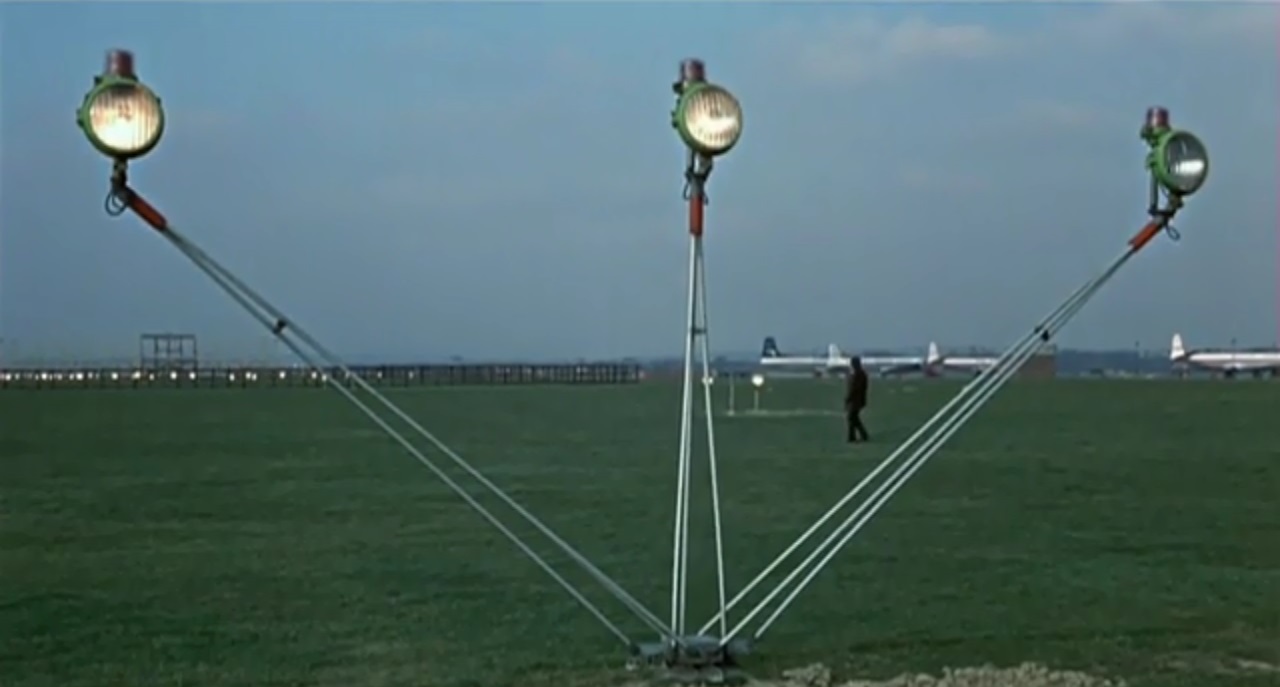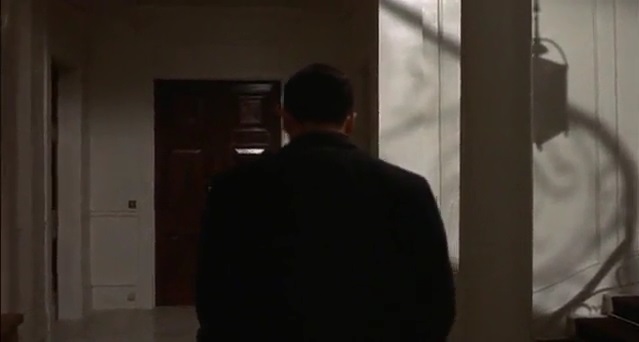otley

Out and back off
the Portobello Road (“you’ve gotta be
careful with this Persian stuff, most of it’s made in Paris”) one
raw February by way of the spy service inadvertently, the man with the Man Ray
shave in beautiful cinematography by Austin Dempster
(editor Richard Best), like James Joyce wondering if the photographer were good
for a fiver. A particularly brilliant view of The 39 Steps, in that vein entirely unnoticed by Vincent Canby of
the New York Times who pronounced
heavily upon it, and by Time Out Film
Guide somewhat more lenient. Hitchcock thanks Clement, a hugely resourceful
and thoroughly capable and remarkably fluent director to say the least, in Frenzy. The fatal shot through a coffee
pot is by way of Frankenheimer’s The Manchurian Candidate, the
empty railway station from Walter Forde’s The
Ghost Train with Arthur Askey,
and there follows quite naturally Val Guest’s The Runaway Bus with Frankie Howerd,
not to mention the peripatetic harp of Charles Frend’s
A Run for Your Money, which turns up outside the Playboy Club (the lad
with the ray gun, “pishoo, pishoo”,
is again by way of The Trouble with Harry). The saga of a skiver
in the toils of espionage and murder involving “one of those bent civil
servants”, if the cowboy in command is an Indian chief one has
“homeless bones” (cf. Amiel’s The Man
Who Knew Too Little).
So Gerald Arthur
Otley leaves the Trad (No. 67, Clement is a genius at
signs and posters throughout the film, his many jokes and asides are thematic,
the entire construction and each scene as well) for the Thames like Gully
Jimson before him, a regular Billy Fisher in London, as Canby did notice after
all or very nearly. Philip Proudfoot (“a bit
Baghdad Hilton for my taste”) of I.C.S. World News Organisation
(“London-Chicago-Tokyo”) is right out of Brooks’ The
Producers, a higher-up in the hostile force and a “great
fairy”, a bloody great London poofter in the
latest with a hulking henchman rather out of it (“he’s got a thing
against youth”) who vets for him. “Now hang on, that’s a bit
primitive. By the time you realize I know nothing, I’ll have taken a
hammering. You’re a sophisticated sort of a villain, wh-wh-wh-what
about the drugs, the truth things, the old pentothal then? Have a go at me
psyche, leave me body alone!” The Writers’ Guild of Great Britain
gave it the award for comedy. “How is
your wife?”
“Oh,
she’s still the same sweet gin-sodden bitch that she always was.”
Otley escapes when an I.C.S. underling (“I’m their assassin”)
on the mystery tours (“d’you know
we’re offering 14 days in the Dolomites for 36 guineas?”) is hoist
with a petard, he has himself arrested (North By Northwest) and is
recruited for a large sum. It’s all a question
of official bumf for sale and loyalties in doubt, it ends with the investiture
of a knight at Buckingham Palace, observed from beyond the pale by Otley, whose
services are no longer required (“the night was coming” says
Beckett, “in which no Murphy could work”). He isn’t even
worth the trouble of killing. “Generally pretty funny,” says Halliwell’s
Film Guide, “but not entirely certain of its own motives,”
stating the critics’ confusion.
Dan Pavlides (All Movie
Guide), who has our Gerry a “British secret service agent called in
to investigate”, finds it “confusing”. Thus Variety, “in seeking to avoid
overheroics as well as the pitfalls of parody, the film has an uneasy lack of a
point of view and fails to focus viewer’s attention on any particular
character or plotline philosophy.”
Catholic News Service Media Review Office, “gets lost in its own
intrigues”. Film4,
“very hit and miss.” Britmovie, “uneven”. TV Guide, “spotty”.
The critical
quandary went unabated even after the magnificent central scene in which Miles,
whose name is Rollo (“Miles is head of M.I.5,
isn’t he, that’s what M stands for”), explains everything
very patiently, which gives you an idea of the quandary. “God
you’re a charmless lot,” Otley exclaims, “how do you trust
each other?”
Or to put it
another way, “they’ll never believe this in the pub,” kicked
out of bed by the Irish landlady, have a go with a smashing bird at a health
farm in the country (cf. George
Pollock’s Kill or Cure with
Terry-Thomas), back in town find digs amid the corpses of blackmailer,
murderer, traitor, “you know.”
A
Severed Head

In which it is
made manifest that from Lubitsch (The
Marriage Circle) one arrives at the films
britanniques of Resnais by way of Clement.
Again six figures,
husband-analyst-brother and wife-mistress-bint, mathematical permutations like
a slot machine paying off variously, with cross-relationships en route that are of great interest. The vintner and the love interest, the trick cyclist and
the bit on the side, sculptor and wife, these define the proper relationships
as understood by the authoress, not as the world sees them (the middle ground
or no-man’s-land has married man and artsy bit, artist and design teacher
at the Royal College, therapist and neurotic ball-and-chain).
The critics
notwithstanding, Shelley explains the title platonically, “a poet is indeed
a thing ethereally light, winged, and sacred, nor can he compose anything worth
calling poetry until he becomes inspired and as it were mad; or whilst any reason
remains in him.”
Screenplay Murdoch-Priestley-Raphael,
décor Richard Macdonald & John Clark, costumes Sue Yelland,
cinematography Austin Dempster, score Stanley Myers.
Bosley Crowther of the New
York Times, “plodding, faithful, doggedly unimaginative... I have rarely experienced such desolation”. Variety, “intellectually
snobbish”. TV
Guide, “sexual escapades of the upper crust”.
Catholic News Service Media Review Office, “purports to be a
sophisticated comedy of manners”. Clarke
Fountain (All Movie Guide), “sophisticated
black comedy sex romp”. Halliwell’s Film Guide, “tolerably sophisticated for
those who don’t know the original.”
Catch Me a Spy
The Soviets
launch one of their British operatives toward a French schoolteacher living
with her uncle, the shadow foreign secretary, in London. There is a wedding,
the honeymoon in Bucharest is interrupted by secret police, the bridegroom is
arrested and flown to Moscow. He is to be exchanged
for a spy caught by the British.
That is one-half
the story, the rest became the critics’
nightmare in its real and seeming complexity.
There is another
agent, a courier really, smuggling book manuscripts out of Russia, he becomes entangled with the wife.
This is the
height of comedy, going back to Clarence Brown’s Flesh and the Devil at one point, with Sacha Pitoeff
and a joke from Alain Resnais setting up The
39 Steps at an empty hotel in Scotland, a parody of Terence Young’s From Russia with Love on a lake between
the two Germanies, Tom Courtenay as a filing clerk
sent into the field, the Cold War one winter.
Marlene Jobert, Kirk Douglas and Trevor Howard, with Richard
Pearson as the head of British Intelligence, “no-one’s supposed to
know that.”
To Variety, “a straightforward spy
thriller” with humor. Time Out Film
Guide did not wish “to imply that anyone might care.”
Water
A superb complex
analysis of modern affairs that covers all bases from regional poverty to a
rock concert at the United Nations, “designer water” and oil and
everything else.
Brenda Vaccaro’s performance as the island governor’s
wife deserved an Oscar and was vilified by Variety and the New York
Times.
Beneath all the
bullshit, Clement wants to say (with a devastating satire of Margaret
Thatcher), there is something worth something.